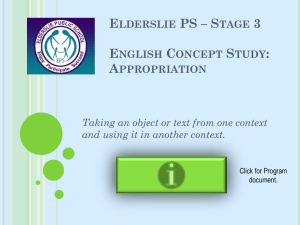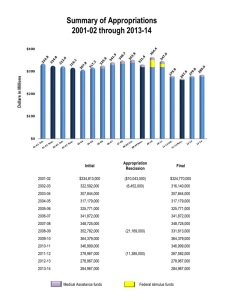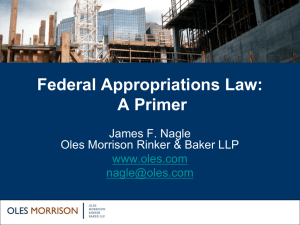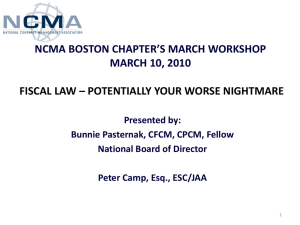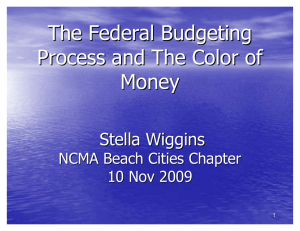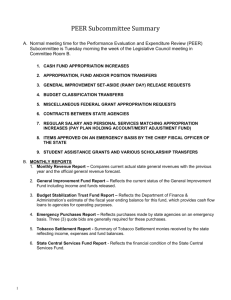Basic Fiscal Law - American Society of Military Comptrollers
advertisement
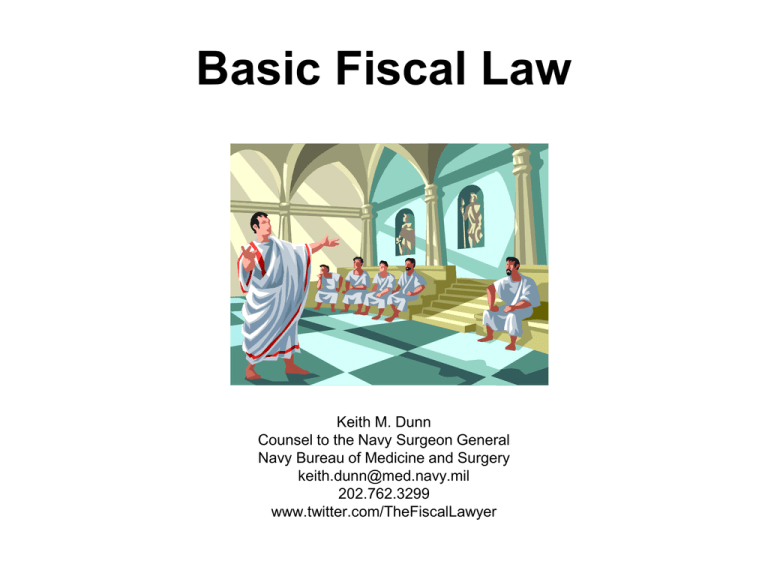
Basic Fiscal Law Keith M. Dunn Counsel to the Navy Surgeon General Navy Bureau of Medicine and Surgery keith.dunn@med.navy.mil 202.762.3299 www.twitter.com/TheFiscalLawyer The Power of the Purse • “No money shall be drawn from the Treasury, but in Consequence of Appropriations made by law . . . “ – Constitution, Article I, section 9, clause 7 what does it mean? “The established rule is that the expenditure of public funds is proper only when established by Congress, not that public funds may be expended unless prohibited by Congress.” United States v. MacCollom, 426 US 317 (1976) Sources of Law • US CODE • AUTHORIZATION ACTS – AUTHORIZE PROJECTS - 10 USC 2802 – AUTHORIZE APPROPRIATIONS - 10 USC 114 – ENACT PERMANENT LEGISLATION • APPROPRIATION ACTS – 31 USC 1301(d) – GENERALLY TEMPORARY • OTHER PUBLIC LAWS • OPINIONS Authorization Act • “ No funds may be appropriated for any fiscal year to or for the use of any armed force or obligated or expended … unless funds therefore have been specifically authorized by law.” 10 U.S.C. 114(a) • “The Secretary of Defense and the Secretaries of the military departments may carry out such military construction projects as are authorized by law...” 10 USC 2802 Appropriations Act An act of Congress that permits Federal agencies to incur obligations and to make payments out of the Treasury for specified purposes. A law must contain express language that it is making an appropriation. §1301(d). Authority to obligate or expend collections without further action by Congress is a continuing appropriation of the collections. DoD Appropriations Act • • • • • • • • Title I - Military Personnel Title II - Operations and Maintenance Title III - Procurement Title IV - Research & Development Title V - Revolving Funds Title VI - Other DoD Programs Title VII - Related Agencies Title VIII - General Provisions How Congress Gives Us Our Money Remember the Bank of Mom -- Don’t mix those envelopes! Other Laws (why having money is not always enough) • T.V.A. v. Hill: notwithstanding Appropriation Act legislative history, lump sum appropriation for the Tellico dam did not repeal application of Endangered Species Act protecting snail darters 437 U.S. 153 Legal Opinions • Opinions from Attorney General • Opinions from Comptroller General – Who may seek decisions/opinions? – DOD Policy: • All requests go through OSD first • 22 Nov 1991 OSD(GC) Memo – Navy Policy: • All requests go through AGC(FM&C) • 5 May 2003 DON GC/ASN(FM&C) Memo THE BOX: PURPOSE – Funds may be obligated and expended only for specified purposes TIME – Funds are available for obligation only for specified time limits AMOUNT – Agencies may not spend more than appropriated PURPOSE • USE ONLY FOR INTENDED PURPOSES “…only for the objects for which the appropriation is made…” 31 USC § 1301(a) PURPOSE • What is the Navy’s “purpose”? • Within the Navy’s various appropriations, there are separate purposes. • Necessary Expenses Purpose[less] • • • • Food Clothing Bottled Water Gifts & trinkets Personal Expenses • Questions to ask: – Is there a reasonable relationship between the proposed expenditure and the purpose for which the funds were appropriated? – What is the benefit to the agency? – What is the benefit to the individual? – Is there a more cost effective way to achieve the agency mission or program goals? • Examples: – – – – Registered traveler programs Health promotion items Recruiting items Gifts and other giveaway items TIME • Unless defined otherwise, every appropriation has a time limit • Funds are available for obligation only during availability of appropriation – Annual Presumption (31 U.S.C. §1301(c) & §8003 of each Appropriations Act – Also multiple, no year, and indefinite accounts • Do not obligate or expend in advance of appropriation. – 31 USC §1341(a)(1)(B) Bona Fide Needs Rule 31 USC 1502(a) The balance of an appropriation limited for obligation to a definite period is available ONLY for: - payment of expenses properly incurred during the period of availability or - to complete contracts properly made within that period of availability. * The appropriation is not available for expenditure for a period beyond the period otherwise authorized by law. Application of the bona fide needs rule • Inventory • Training • Subscriptions Continuing Needs/Future Years’ Needs Current FY funds may be obligated to satisfy a need which arose in a prior FY where: - need was not previously met for legitimate reasons - need continues into the subsequent FY AND - incurring obligation was discretionary with the agency Funds appropriated for a specific fiscal year are not legally available for the needs of a future fiscal year. The Life of a Definite Account CURRENT EXPIRED 5 YEARS CLOSED FOREVER The Life of an Indefinite Account CURRENT CLOSED* * NO EXPENDITURES 2 YEARS AND NO LONGER NEEDED 31 USC 1555 Adjustments to Expired Accounts • 31 USC 1553(a) • Retains identity • Available for – Recording – Adjusting – Liquidating obligations properly chargeable Closed Accounts • 31 USC 1552 • All Balances Cancelled • Not Available for Obligation or Expenditure for ANY Purpose! • Existing Bill? • Receipt? AMOUNT • The rules revolve around two concepts: – do not spend your money too quickly (i.e., make it last the entire fiscal year); – do not spend more than you have available at the time (you cannot hoard money, either – sec. 8004) Apportionment “ . . . [A]n appropriation available for obligation for a definite period shall be apportioned to prevent obligation or expenditure at a rate that would indicate a necessity for a deficiency or supplemental appropriation for the period.” 31 U.S.C. 1512(a) . . . An appropriation shall be apportioned not later than the later of the following: (1) 30 days before the beginning of the fiscal year for which the appropriation is available; or (2) 30 days after the date of enactment of the law by which the appropriation is made available.” 31 U.S.C. 1513(a) Earmarks • The designation of a part of a lump sum appropriation for a particular purpose – must be in the statute itself to be binding – limitations on legislative history • can illuminate • cannot provide that which is not there DoD memo dtd 10 Feb 2006 OMB memo dtd 15 Feb 2007 Executive Oder, Protecting American Taxpayers From Government Spending on Wasteful Earmarks, 29 Jan 08 Augmentation • No agency may augment its appropriations from outside sources or from improper internal sources unless statutorily authorized to do so. • Amounts appropriated for a purpose represent a limitation Congress has fixed for that purpose and all expenditures for that purpose must come from that appropriation and may not exceed that amount absent express statutory authority. . . . an official or agent of the Government receiving money for the Government from any source shall deposit the money in the Treasury as soon as practicable without deduction for any charge or claim.” 31 U.S.C. §3302(b) Repayment Exception • Authorized “repayments” are either “reimbursements” or “refunds.” • “Reimbursements” are amounts collected which may, by law, be credited directly to appropriations. • “Refunds” are amounts collected for payments made in error, overpayments, or adjustments for previous amounts disbursed, including returns of authorized advances. Gifts 10 USC 2601 – general gift statute 10 USC 7220 – gifts for welfare of enlisted members The Antideficiency Act • The ADA is codified at Title 31 United States Code: 31 U.S.C. § 1341 (prohibiting obligations or expenditures in excess of appropriations and contracting in advance of an appropriation) 31 U.S.C. § 1342 (prohibiting government employees from accepting voluntary services) 31 U.S.C. §§ 1511-1517 (requiring apportionment/ administrative subdivision of funds and prohibiting obligations or expenditures in excess of apportionment or administrative subdivision of funds) 31 U.S.C. § 1344 (prohibiting the unofficial use of passenger carriers) Types of Violations • Purpose • Time • Amount Reports • 31 USC 1517 & 1351 • President, Congress, and GAO • OMB Circular A-34 • FMR vol. 14 Sanctions & Penalties • Administrative – Up to removal • Criminal – If knowing & willful – 2 years in jail – $5000 – Or both


